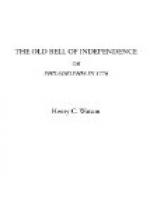“’Now, you dastardly ruffian, avow your villanies, and inform me where I shall find Miss Howard, or, by heaven, I will send you where the tenor of your life will be hard to account for.’
“The fierceness of the whig soldier’s manner, and the consciousness of being wholly in his power, completely humbled the tory, and he begged his life, and promised to conduct the troops to his encampment, where they would find the lady in safety.
“The tories were now effectually routed; some were killed, some wounded, others captured, and some had escaped. A few miles’ travel, and Captain Edwards and the men under his command arrived at the habitation of the tories. A coarse slovenly soldier was pacing the ground in front of the building, and, on the advance of the continental troops, presented his musket, and ordered them to halt. Captain Edwards briefly informed him of the reverse that had taken place in the fortunes of his commander, and concluded by telling him that ’Submission was safety—resistance death.’
“The door was now burst open, and in a moment Miss Williams was folded in the arms of her lover.
“Little more remains to be told. No entreaties of Captain Edwards, or persuasions of her aunt, could induce Miss Williams to give her hand to her admirer till the close of the war. On the establishment of peace, Colonel Edwards, (for he had received that rank,) was made happy in the possession of his long-tried affection. Lieutenant Brown served under his captain during the war, and, on the promotion of Captain Edwards, succeeded to his command. The tory Lewis, and the remainder of his guilty accomplices, were captured shortly after the occurrence of the events I have related, and executed for desertion.”
“The tories generally received the worst of every encounter,” remarked Higgins; “at least, so all our love-story tellers say.” “What I have told you I know to be true—just as Bill Moore, who was one of Captain Edwards’ men, used to tell it,” replied old Harmar.
“I believe it to be a fact that the tories did get the worst of most of the encounters in which they had an equal number of our men to deal with. The reason was plain. They had not the same great motives to spur them to daring and noble effort; and the whigs fought against them with more ardor than they would against the British,” said Wilson.
“Captain Edwards was a host. Just think of one man daring to resist the attack of twenty men, and killing five of them before he was taken. It seems like the deed of a fabulous hero,” remarked Mr. Jackson Harmar.
“The case was a desperate one, and demanded desperate conduct. A surrender would not have saved his life, and might have secured Miss Williams in the hands of Lewis. By a bold attack, Edwards won new reputation and alarmed his men, who then saved his life and the honor of his beloved,” said old Harmar, in defence of his hero.
“I expect they would have murdered the poor man, and then Lewis would have forced Miss Williams to become his wife—the wretch!” put in Mrs. Harmar.




